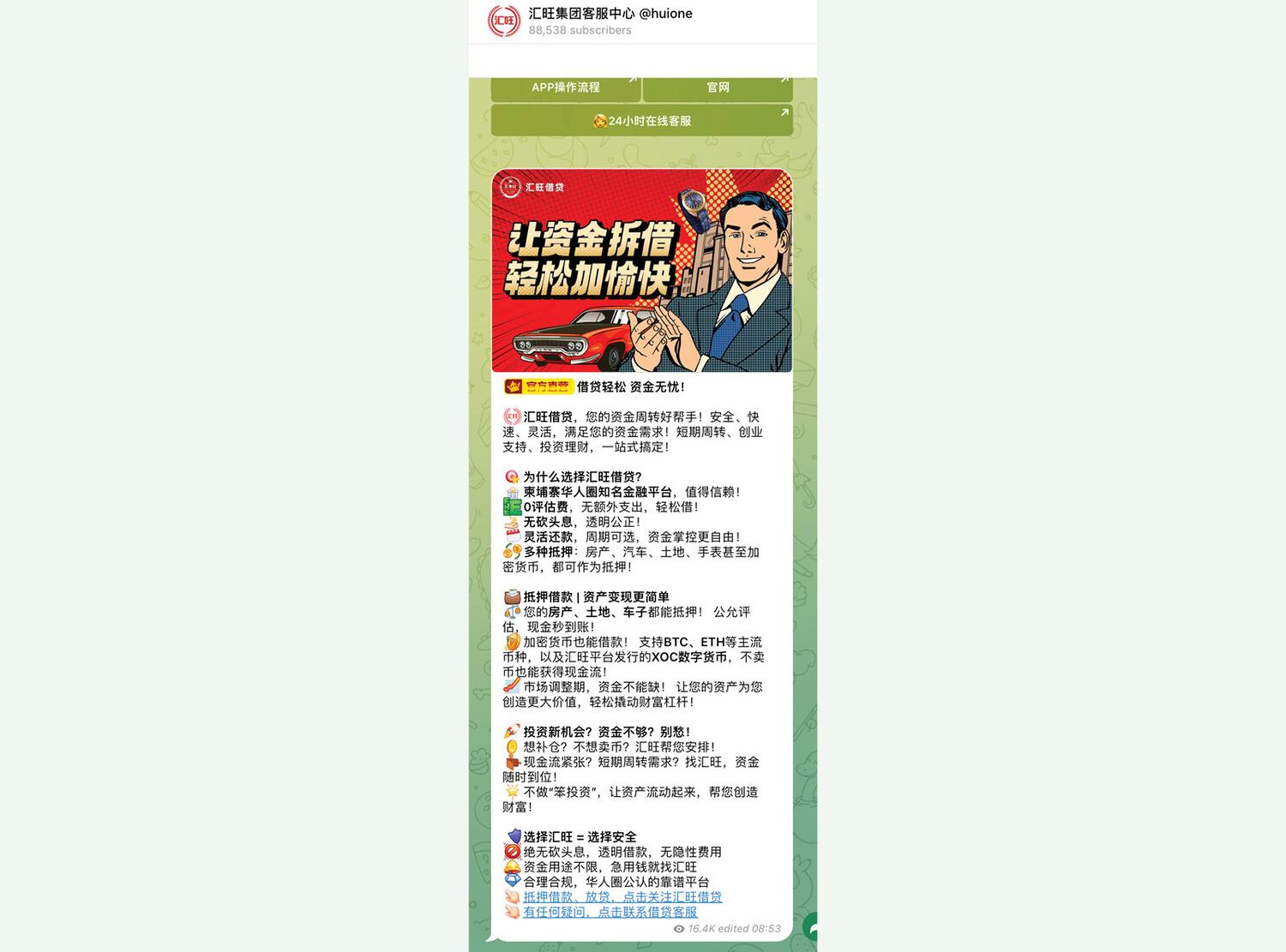Huione Pay, the banking arm of what’s been called the world’s “largest ever illicit online marketplace,” has been stripped of its banking license, the National Bank of Cambodia confirmed to RFA this week.
The company is part of the wider Huione Group of Cambodia, a conglomerate which operates several “Huione” products, including marketplaces, banking and finance apps.
One of these, a Telegram marketplace, has been identified as a notorious place for crime tied to up to $24 billion in illicit transactions.
Huione Pay’s license was withdrawn owing to its noncompliance with “existing regulations and recommendations that may have been made by the regulators,” a National Bank of Cambodia spokesperson told RFA by email on Thursday.
The spokesperson did not say when the license was withdrawn or what repercussions the company might face if they continue to operate. Huione did not respond to RFA’s requests for comment before publication.
It has previously denied criminal activity– when Huione was identified by the cryptocurrency compliance firm Elliptic to have facilitated millions of dollars in criminal payments, it issued a statement insisting that it was a mere “information publishing and guarantee trading platform” bearing no responsibility for the goods and services others used it to trade.
RELATED STORIES
World’s ‘largest illicit online marketplace’ is just a download away
Report: Online cybercriminal marketplace is part of Cambodian conglomerate
Hun To went after the press; who really won?

However, according to the United Nations Office on Drugs and Crime, or UNODC, Huione’s Telegram marketplace has become one of the main arteries of illicit commerce in Southeast Asia, a region grappling with an epidemic of human trafficking and internet fraud.
The UNODC’s regional representative, Benedikt Hofmann, welcomed the termination of Huione Pay’s license.
The withdrawal “will send an important signal, especially given the high profile of Huione and its outsize role for the region’s criminal ecosystem,” he told RFA.
Hofmann cautioned, however, that this latest development would not be a cure-all for the region’s crime epidemic – nor would it necessarily mean the end of Huione.
“Huione is in many ways the tip of the iceberg and we will see users shifting to other, similar providers which have emerged in the region,” he added.
Much of the money that was being moved through Huione Pay came from illicit activities linked to cyberscamming, the UNODC found. For more than half a decade the region in which Huione operates has been dotted with compounds housing what the U.N. says are hundreds of thousands of enslaved workers forced to perpetrate a type of cyberscam commonly known as “pig butchering”. The practice is estimated to swindle billions of dollars from its victims around the world every year.
Elliptic, the cryptocurrency compliance firm, traced billions of dollars flowing from Huione Guarantee, the Telegram marketplace, to Huione Pay. This was “likely so that these criminally-derived funds could be cashed out,” firm founder Tom Robinson told RFA.
“I think this will be a blow to Huione Guarantee,” Robinson added. “We have direct evidence of Huione Pay laundering money from scam victims around the world, including the elderly and vulnerable. They are willing facilitators of pig butchering and other fraud, so any regulatory action against them should be welcomed.”
The loss of Huione Pay’s license, which has not been previously reported, does not seem to have curtailed the company’s activities, however. As recently as Thursday the company’s official Telegram channel, linked to on its website, was offering loans to customers. A post on February 27th promoted the launch of a Huione-branded Visa card. Visa did not respond to requests for comment by press time.
News of Huione Pay’s license being withdrawn was greeted as overdue by a former employee who asked not to be identified for fear of reprisal. They told RFA it was openly acknowledged within the company that there were two sets of accounts maintained.
“They cook the books,” the former employee said.
While the company handled billions of dollars, “close to none” of those transactions were made available to the compliance department, which was relegated to the role of advisors, “ whose advice were never taken seriously,” the former employee said.
One of Huione Pay’s three directors is Hun To, a cousin of Cambodian Prime Minister Hun Manet.
Official censure of a company so close to the inner circle of Cambodia’s ruling family is unusual. But Jacob Sims, an expert on transnational crime at the United States Institute of Peace, told RFA that the withdrawal of Huione’s banking license should not be read as a herald of reform.
“It all ultimately amounts to a brand switch,” Sims said. “It’s basically an easy thing for the regime to point to and say, ‘Look, we’re cracking down on this’ without doing really anything but consolidating Huione’s available brands.”
For Sims, there’s one way the Cambodian government could show it was serious about cracking down on the crime wave Huione has been surfing: “Arrest all the people involved in Huione.”
Edited by Abby Seiff and Boer Deng
This content originally appeared on Radio Free Asia and was authored by Jack Adamović Davies for RFA Investigative.
This post was originally published on Radio Free.